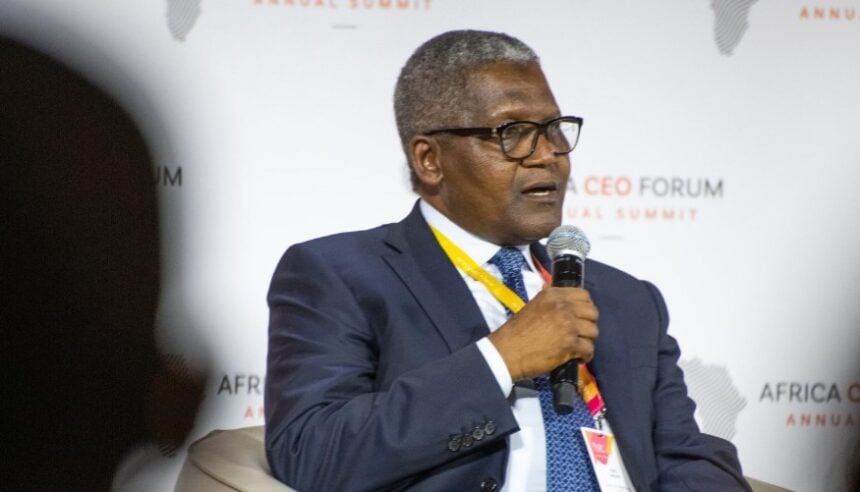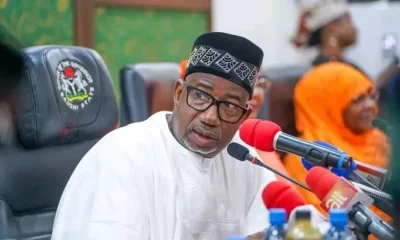Business
Monopoly claims can discourage investment – Dangote

Africa’s richest man, Aliko Dangote, has warned that claims of monopoly, especially in the petroleum sector, are capable of discouraging local investment in the nation’s economy.
The founder, Dangote Group, stated this in Abuja on Monday at the Inaugural Annual Downstream Petroleum Week organised by the House of Representatives Committee on Petroleum Resources (Downstream).
Represented by the Group Chief Strategy Officer at Dangote Industries Limited, Aliyu Suleiman, the Kano-born businessman called for policies that encourage productivity, innovation, and competition across critical sectors of the economy.
On the issue of monopoly in the refining of crude oil, Dangote said, “Too many people with the means to build industries chose instead to invest abroad. We decided from afar, adding little value to our economy. We have chosen differently. We have chosen to go to Nigeria. We have chosen to build here, to employ here, to produce here. Let us not use the cry of monopoly to stall growth. No one is prevented from investing.
We welcome others to build their own refineries, and we will offer support in whatever way we can.
“Nigeria holds the natural competitive advantage in refining. We enjoy proximity to oil and gas supply. We should therefore work together to develop this sector.
“We should work to enact and implement laws that will help this sector to prosper. Let us protect our industries and deliver the economic transformation this country deserves.”
According to him, the Dangote Refinery can meet the nation’s demand for diesel, premium motor spirit and jet fuel and have excess for export.
He added that in no distant time, the refinery would be listed on the stock exchange, giving Nigerians the opportunity to become shareholders.
He said Africa’s refining sector remains underdeveloped, relative to its consumption and volume of crude produced on the continent.
“While Europe and Asia refine over 95% of their petroleum product, Africa refines only 40%. In sub-Saharan Africa, there are very few large functional refineries today. This is understandable because refining is capital-intensive. It is technologically complex and often is a low-margin business. As a result, many entrepreneurs and governments have chosen to stay away. But at Dangote, we are known for taking bold steps. We are known for making large-scale investments to substitute imports and create value in the country.
“This is a challenge that we were happy to take. When it came to tackling the refining challenge, we decided to do it even though it was not easy. Building a world-class refinery anywhere in the world is a huge task. It is capital-intensive and very demanding. To build ours, we collected over 2,700 hectares of land and pumped 65 million cubic metres of sand to stabilise the site. We installed over 250,000 foundation bars and laid millions of metres of piping, cabling, and wiring. At peak, we had over 60,000 people on site, of which 50,000 were Nigerians. We had these people working around the clock across hundreds of disciplines and nationalities.”
According to him, “The Dangote refinery can meet all of Nigeria’s demand for diesel and jet fuel and still have a surplus for exports, which can be used in valuable foreign exchange for Nigeria. The refinery can meet 90% of Nigeria’s PMS requirements. This is based on the official consumption number of 50m per day.
“Across the world, major oil producers typically meet their petroleum product requirements through their own domestic refineries, not through imports. The United States, for example, imports only about 8% of their petroleum products requirement. If you look at most of the major crude oil producers, you will see that they do not import more than 10% of their petroleum products from the US. This is where Nigeria should be heading. And with the advent of the Dangote Refinery and the unbundling of the sector, we hope that we will get there.”
On the business philosophy of the Dangote Group, Suleiman said, “Our strategy across all our businesses is to provide our customers with high-quality products at attractive prices. This is not just in the refinery but across all the businesses. It is the same with cement, sugar and the rest.
“Refined products from our refinery are of higher quality, and yet our prices are below import parity and below the average prices across most African countries. Across Africa, PMS and diesel sell for around $1 per litre, net of a tax system of sorts. But in Nigeria, the current price is below $0.60 per litre.
“This is a huge cost benefit for Nigerians. Even though the cost-benefit may not be immediately obvious, because before the advent of the Dangote refinery, subsidies were used to mask the real market price, still, we find ourselves in a situation where Nigeria imports petroleum products, while at the same time, the Dangote refinery is exporting. This is a paradox that we must address for this sector to grow.”
Also speaking at the event, the Speaker of the House of Representatives, Tajudeen Abbas, has described the Dangote Petroleum Refinery as a catalyst in the nation’s quest for energy sufficiency.
Despite spending over $18bn for the turnaround maintenance of state-owned refineries in Port Harcourt, Kaduna, and Warri, Nigeria continues to rely on imported petroleum products, a challenge currently being addressed with the establishment of the Dangote Refinery.
A few months ago, the Group Chief Executive Officer of the NNPCL, Bayo Ojulari, hinted at the possible sale of the refineries, owing to their age and inability to meet the needs of energy consumers in the country.
He, however, reversed himself, following criticisms mounted by the House of Representatives Committee on Petroleum Resources (Midstream), chaired by Hon. Odianosen Okojie.
Represented by the Deputy Speaker, Benjamin Kalu, the Speaker stated that the theme of the conference, ‘Celebrating our successes, confronting our challenges and finding solutions for the petroleum downstream sector,” is a pointer to what the country can do if the right policies are in place.
He also said the anticipated emergence of other private indigenous refineries underlines the need for the National Assembly to continue to create a functional environment for industries to thrive.
Abass said the outcome of conferences such as this not only makes the laws the parliament makes more pertinent and productive but also ensures that it will receive the avid cooperation and support of industry leaders.
The Speaker therefore urged the stakeholders to come up with innovative and creative solutions that will revamp the petroleum downstream sector, contribute to the overall development of the economy and positively impact the country as a whole.
He said, “The effective take-off of the Dangote Refinery marked a turning point in our nation’s quest for energy self-sufficiency. The anticipated emergence of other private indigenous refineries underlines the need for the National Assembly to continue to create a functional environment for industries to thrive.
“I therefore cannot stress enough the imperative of this conference and its implications for strengthening the systems around the petroleum sector for improved productivity and accountability.”
He stressed the importance of the event to the development of the nation given the calibre of industrial players who came as participants, saying, “Indeed, agenda-setting programmes, such as this conference, which tend to galvanise critical stakeholders in the petroleum downstream sector, not only foster inclusiveness and commitment to genuine national development but also reinforce citizens’ trust in the commitment of the National Assembly and government institutions in driving sustainable development.”
He pledged the commitment of the 10th House to continuously intervene in the petroleum sector, through legislative frameworks, to open up more businesses for the nation and its citizens.
“Our legislative responsibility has always been to craft policies, enact laws, and provide the oversight that will strengthen the downstream sector and ensure that it contributes to a more secure, efficient, and resilient Nigerian economy.
“By bringing together government, industry, labour, and investors to share perspectives, confront challenges, and develop practical, forward-looking solutions to the challenges in the sector, this forum ensures that the conversations here will inform the framework of any policy in the energy landscape for years to come,” he added.
Earlier in his welcome address, the Chairman of the House Committee on Petroleum Resources (Downstream), Ikenga Ugochinyere, advised labour unions and industry players to address pending issues using constructive engagement.
He added that the Committee is aware of the recent labour concerns involving Dangote Refinery and sector unions, noting that while such issues are not uncommon in developing economies, they should not be used to scuttle national productivity.
According to him, the downstream sector has, in the past few years, witnessed innovative changes which he said have rubbed off positively on the Nigerian economy.
He highlighted several ongoing projects across the country, including “The 650,000 barrels per day Dangote Refinery, the Waltersmith Modular Refinery in Imo State, expanding from 5,000 to 50,000 barrels per day; the OPAC Refinery in Delta State and the Indorama Petrochemical expansion, which is already enhancing fertiliser production and gas utilisation.
“The transformation we are witnessing is born of courage, clarity, and innovation. Our downstream sector is now more open, efficient, and ready for investment. Nigeria must refine what it produces and consume what it refines.
“Progress must be matched with persistence. We must sustain investor confidence, create jobs, and strengthen our energy independence. This is how nations grow, by empowering local industries to produce, compete, and thrive.
“No reform can succeed without industrial harmony. While labour issues are inevitable, they must never be allowed to undermine productivity or national stability.”
On his part, the Minister of State for Petroleum Resources (Gas), Ekerikpo Ekpo, said the downstream sector has witnessed giant leaps in the past few years under the leadership of President Bola Tinubu, noting that the gas sector is not left out of the reforms currently going on in the industry.
“We have come to celebrate because in the past few years, Nigeria’s downstream sector has recorded remarkable development, from the implementation of the regulation policies and liberalisation of the petroleum market to renewed private investment in domestic refining and storage capacity.
“We are also witnessing a transformation in our gas value chain. As part of the President’s Renewed Agenda, the Decade of Gas initiative is driving an ambitious programme to deepen domestic gas utilisation, expand infrastructure, and accelerate the transition to clean up wells, such as those with compressed natural gas, liquefied natural gas, and petroleum gas.”
According to him, these efforts are designed to enhance energy accessibility, reduce dependence on imported fuels, and create new economic opportunities for Nigerians, from households and small businesses to large-scale industries.”
He listed some gaps in the downstream sector, saying, “While these achievements are commendable, we must also be honest about the challenges that persist. Our downstream sector continues to face issues related to infrastructure deficits, market volatility, supply chain inefficiencies, and the need for regulatory clarity.”
The Minister further called for collaboration between the tiers of government to address the challenges.
“Addressing these requires sustained collaboration between the executive and legislature, underpinned by sound policy direction and consistent implementation. It is also a call for enhanced private sector participation, investment in technology, and adherence to global best practices.
“As policymakers, regulators, and operators, we must ensure that reforms are people-centred, designed to make energy more affordable, accessible, and sustainable for all Nigerians.”
The Ministry, he stressed, is focused on accelerating gas infrastructure development, promoting gas utilisation and driving regulatory and investment reforms.
The event was attended by prominent Nigerians, including the Speaker of the House of Representatives, Tajudeen Abbas, and the Minister of State for Petroleum Resources (Gas), Ekperikpe Ekpo. (Punch)
-

 Celebrity Gist16 hours ago
Celebrity Gist16 hours agoI love Nicki Minaj – Donald Trump
-

 World News16 hours ago
World News16 hours agoKing Charles Breaks Silence After Arrest Of Brother, Prince Andrew, Over Misconduct Allegations
-

 News16 hours ago
News16 hours agoJUST IN: Rivers senator, Barinada Mpigi, dies at 64
-

 Politics24 hours ago
Politics24 hours ago“We Will Declare War”—Governor Bala Mohammed Spits Fire Over Tinubu’s ‘Incessant’ Arrest of Opposition Leaders
-

 News20 hours ago
News20 hours agoOndo Monarch Gunned Down Outside Palace
-

 Metro16 hours ago
Metro16 hours agoNigerian bags 8-year jail term over $1.3m cyber fraud in US
-

 Sports16 hours ago
Sports16 hours agoEPL: Arteta Urges Arsenal To Channel ‘Pain’ From Wolves Draw Into Tottenham Clash
-

 News16 hours ago
News16 hours agoJUST IN: Many feared dead as terrorists storm homes, shoot indiscriminately in Kebbi communities


















